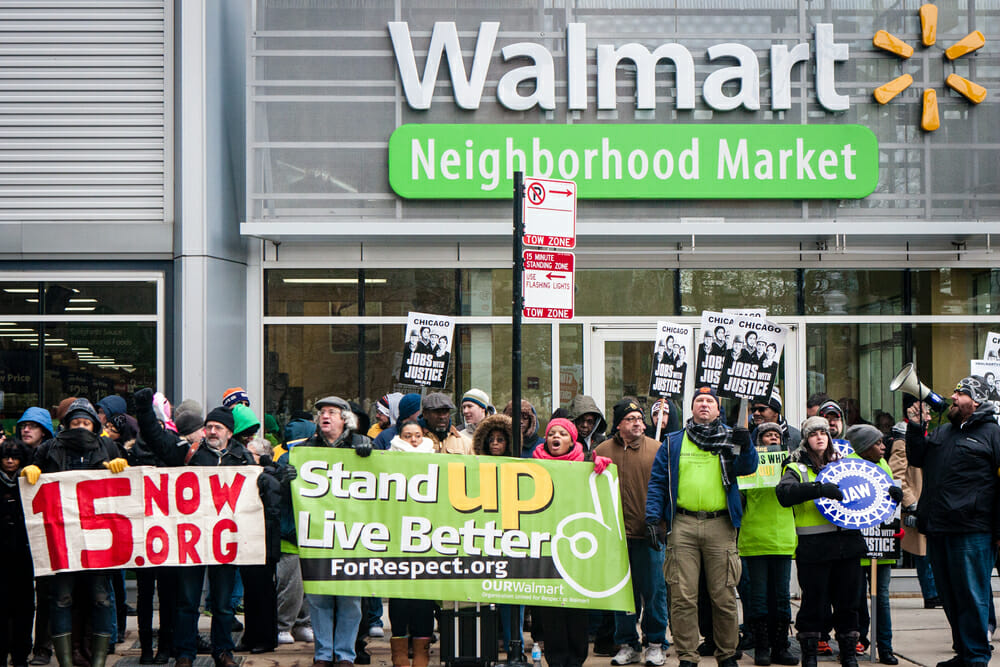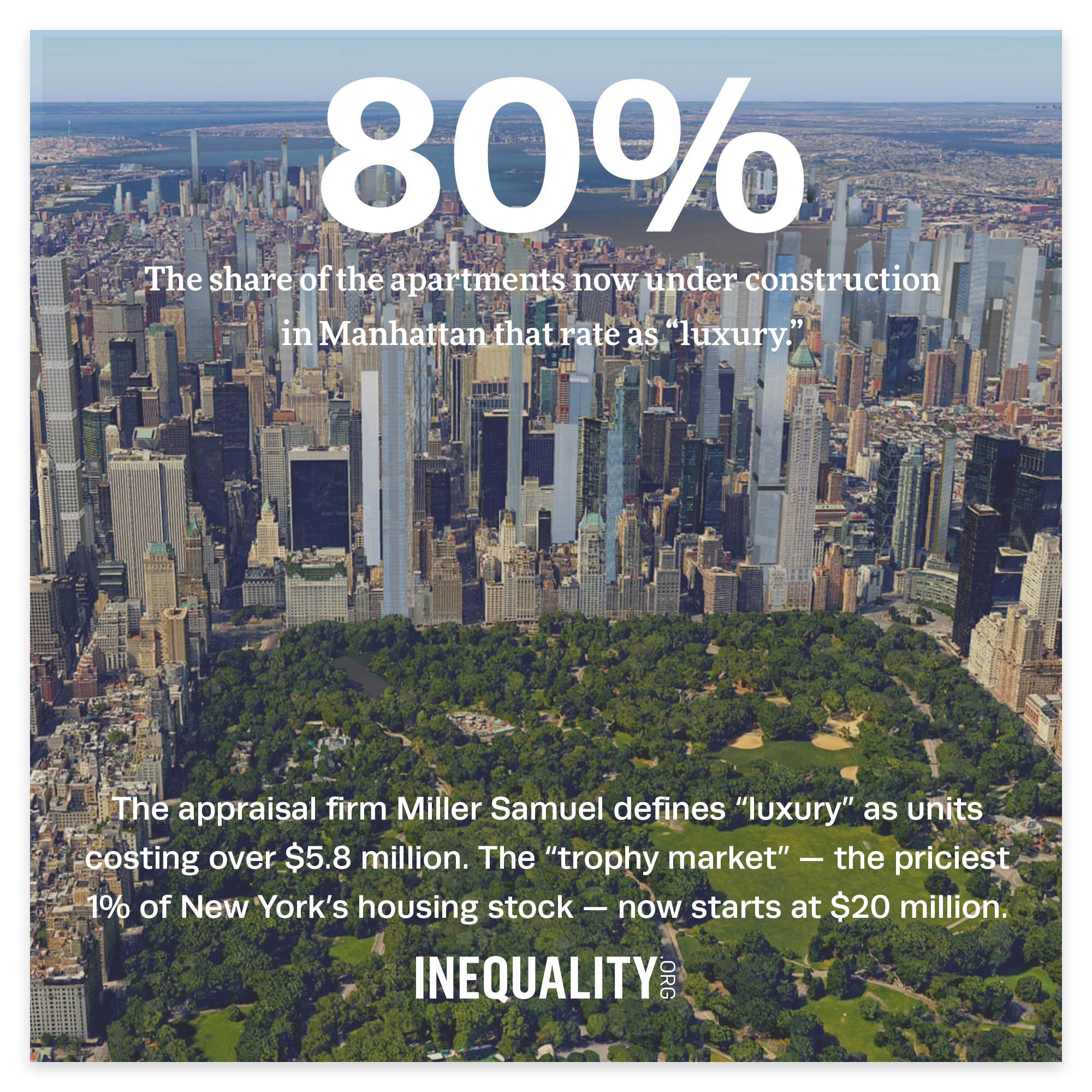What could possibly be driving this new-found affection for a higher minimum wage from a CEO who took in $23 million last year? How about a tip of the hat to activist Walmart workers and their years of organizing for a real living wage!
|
THIS WEEK
|
|
Yet another sign that our inequality conversation is scaring the corporate elites who hold disproportionate power over us: Walmart CEO Doug McMillon told the company’s annual shareholders meeting last week that the time has come for Congress to raise the minimum wage!
What could possibly be driving this new-found affection for a higher minimum from a CEO who took in $23 million last year? How about a tip of the hat to activist Walmart workers and their years of organizing for a real living wage! At last week’s annual meeting, these workers presented Walmart shareholders with a resolution to put hourly workers on the company’s corporate board.
Walmart workers — and workers everywhere — deserve a living wage and democracy on the job. We’ve got more this week on the retail workers demanding more from companies like Walmart. And a reminder for those of you interested in taxing billionaire families like Walmart’s Waltons: You still have time to join Rep. Pramila Jayapal, economist Paul Krugman, and author Barbara Ehrenreich at our upcoming June 25 conference on taxing the very rich. Details at the bottom of this week’s issue!
Chuck Collins, for the Institute for Policy Studies Inequality.org team |
|
|
|
|
INEQUALITY BY THE NUMBERS
|
 |
|
|
|
|
|
|
FACES ON THE FRONTLINES
|
 |
Retail Workers Nationwide are Uniting for Respect
|
| Toys ‘R’ Us workers won a crucial severance pay victory last year after the company closed its U.S. stores. Private equity firms KKR, Bain, and Vornado had bought up the legendary toy store just a decade earlier, saddled the company with enomous debt, and left the 33,000 laid-off employees without access to the millions owed in severance. But those Toys ‘R’ Us workers didn’t let private equity vultures enrich themselves on the backs of employees who’d been with the store for decades. They fought back. They took creative actions across the country and pushed legislators and pension funds to get on board, eventually winning a $20-million severance fund from Bain and KKR. Their victory reflects a broader movement that’s been fighting for justice for retail workers. We have more this week from activists with United for Respect, the retail worker group that’s leading the charge. |
|
|
|
|
WORDS OF WISDOM
|
 |
|
|
|
|
|
PETULANT PLUTOCRAT
OF THE WEEK
|
 |
Watch Who You’re Calling a ‘Monopoly,’ Buddy!
|
| Does computer giant Apple wield monopoly power over the high-tech marketplace? Perish the thought! Apple CEO Tim Cook told CBS News last week that “I don’t think anybody reasonable is gonna come to the conclusion that Apple’s a monopoly.” And Cook added that he “strongly disagrees” with those who have come to that conclusion, like U.S. Senator Elizabeth Warren. She’s now proposing legislation that would break up the nation’s digital powerhouses. Today’s tech giants, Warren explains, have “bulldozed competition” and “tilted the playing field against everyone else.” Cook has hundreds of millions of reasons to resent Warren’s call for “big, structural changes” in our computing status quo. His original pay deal with Apple, worth $376 million in 2011, has soared in value as Apple share prices have multiplied more than six times over since he became the company’s CEO. |
|
|
|
|
GREED AT A GLANCE
|
 |
|
|
|
|
|
|
TOO MUCH
|
 |
| How Wealthy Have Our Super Wealthy Become? |
| We have a great deal of statistical data, in America today, about the economic circumstances of Americans who live in poverty. We know far less, by contrast, about Americans who live amid great wealth. And much of what we do know, suggests a revealing new study, turns out to be wrong. America’s wealthiest, this new study details, almost certainly hold substantially greater personal fortunes than our standard analyses of the nation’s distribution of wealth indicate. What are these analyses not taking into account? Inequality.org co-editor Sam Pizzigati, author of The Case for a Maximum Wage, has more. |
|
|
|
|
|
|
MUST READS
|
This week on Inequality.org
Chuck Collins, Business School Graduates — Don’t Work for Billionaires. Bring your passion, education, and social networks to the fight for an economy that works for everyone.
Jessicah Pierre, Racism as a Public Health Crisis. Milwaukee’s novel approach to combating racial inequity should inspire other cities.
Dedrick Asante-Muhammad, Tracy McCracken, and Elizabeth Beauchamp, A Foul Smell in Eight Mile, Alabama. A chemical leak shows how fair housing laws can advance environmental and racial equity.
Elsewhere on the Web
Alan Krueger, The Economics of Rihanna’s Superstardom, New York Times. The music industry can tell us a great deal about our winner-take-all economy.
Alexandra Thornton and Galen Hendricks, Ending Special Tax Treatment for the Very Wealthy, Center for American Progress. America’s tax code no longer adheres to the core progressive tax principle of ability to pay.
Chris Dillow, Inequality Ruins the Economy, Evonomics. The eight most pivotal reasons why.
Hillary Hoffower, Why do logos in luxury goods tend to get smaller as the price rises? Style. If people who want to seem rich buy handbags bathed in Louis Vuitton logos, these bags no longer signal wealth. So the truly wealthy use more discreet markers that only other insiders can recognize.
Garvin Jabusch, Inequality in the US is at the root of the trade wars, Financial Times. A chief investment officer of a green-oriented consultancy explains the reasons.
Ted Chiang, It’s 2059, and the Rich Kids Are Still Winning, New York Times. An award-winning science fiction writer envisions our future once concentrated wealth starts concentrating on tweaking our DNA. |
|
|
|
|
A FINAL FIGURE
|
 |
|
|
|
|
|
| UPCOMING CONFERENCE |
 |
| Finding the Cure for Excessive Wealth Disorder |
The Institute for Policy Studies, Inequality.org, and the Economic Policy Institute invite you to attend a day-long conference on Taxing the (Very) Rich. Join keynote speaker Paul Krugman, along with other policy experts, activists, and elected officials who will be making the case for taxing the very rich — and debating how best to accomplish that taxation!
Any serious policy agenda geared towards combating inequality and raising living standards for the vast majority, the conference will help show, must look to ultra-high earners in the top 0.1 percent, the elites who wield disproportionate economic and political power.
Free with Eventbrite Ticket. |
|
|
|
|